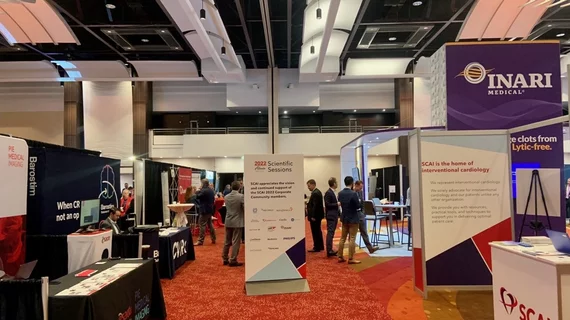TPV valves, CTO PCI and more: SCAI 2022 updates for interventional cardiologists
Interventional cardiologists and other heart specialists from all over the world traveled to Atlanta this week for SCAI 2022, the 45th annual meeting of the Society for Cardiovascular Angiography and Interventions (SCAI).
SCAI 2022 is a busy show, jam-packed with innovative technologies and late-breaking research, and even the most diligent attendee may find that they missed something along the way. Read below to catch up on the weekend’s first two days:
Evaluating the safety and effectiveness of Medtronic’s Harmony Transcatheter Pulmonary Valve system
Medtronic’s Harmony transcatheter pulmonary valve (TPV), which gained FDA approval for treating adult and pediatric patients back in March 2021, is associated with positive clinical and hemodynamic outcomes after one year, according to one session presented at SCAI 2022.
The analysis focused on 108 patients who received an iteration of the Harmony TPV. Data came from a variety of trials, and all patients presented with congenital heart disease or pulmonary regurgitation (PR). The mean patient age was 29 years old and 62% were male. There were no deaths after one year, and more than 90% had no or trace paravalvular leak.
“We knew that Harmony TPV patients were doing well acutely, but this data now validates these findings in the intermediate term.” Daniel S. Levi, MD, a specialist with Mattel Children’s Hospital at UCLA in Los Angeles, said in a statement. “Even a year after implant, the valve is continuing to function well without significant interventions, obstruction or regurgitation. This gives us confidence that we are going down the right treatment path with this pulmonary valve.”
SAFE-PAD: A new comparison of paclitaxel drug-coated devices and non-drug coated devices for peripheral artery disease
There is no significant difference in survival among peripheral artery disease (PAD) patients treated with a paclitaxel drug-coated device (DCD) or non-drug coated device (NDCD), according to the team behind the SAFE-PAD study.
While a previous meta-analysis had found that DCDs may increase the risk of mortality, these latest findings found the opposite to be the true. Nearly 170,000 patients were included in the study, and 41.9% were treated with a DCD. The median follow-up period was 3.52 years. The similar findings between treatment strategies were seen across all risk subgroups, but the mortality rates were closest when looking specifically at low-risk patients. Several other studies in the past couple years have also not shown a safety signal linked to paclitaxel coated intravascular devices.
The U.S. Food and Drug Administration (FDA) collaborated with the study’s authors in the development and execution of this study.
Early data on the Alleviant System for heart failure with preserved ejection fraction and heart failure with reduced ejection fraction
The Alleviant System, a no-implant interatrial shunt device from Alleviant, is associated with significant improvements after six months, according to one session presented during SCA 2022.
Researchers examined data from the Alleviate-HF-1, Alleviate-HF-2 and Alleviate-HFrEF trials, which included patients who presented with heart failure with preserved ejection fraction (HFpEF) or heart failure with reduced ejection fraction (HFrEF). Thirty-one patients have been evaluated so far, and echocardiography was used to confirm that all shunts remained patent after six months. Shunt patency was also confirmed in all 10 patients who have had follow-up for one full year.
The team noted that increases in Kansas City Cardiomyopathy Questionnaire overall summary scores were seen six months after the HF-1 study and three months later the other two studies.
“Unfortunately, we know that this group of heart failure patients currently has limited treatment options,” lead author Colin M. Barker, MD, director of the cardiac cath lab at Vanderbilt University Medical Center in Nashville, Tennessee, said in a statement. “This early data is promising and shows that we are headed down the right path in developing a new safe and effective approach, without the burden of an implant, to help address the unique needs of this large and underserved patient population.”
Alleviant Medical is now planning a “large multi-national prospective, randomized, sham-controlled trial” focused on its no-implant interatrial shunt device. Recruitment is scheduled to begin by the end of 2022.
PROGRESS-CTO: Taking a closer look at chronic total occlusion percutaneous coronary intervention outcomes
Researchers provided a new analysis of the PROGRESS-CTO registry to examine patient outcomes associated with chronic total occlusion (CTO) percutaneous coronary intervention (PCI).
The group examined data from more than 10,000 patients treated from 2012 to 2022. The mean age was 64 years old, and 81% of patients were men. While 62% of patients had a history of PCI, another 43% had a history of diabetes and 29% had a history of coronary artery bypass graft surgery.
Overall, the in-hospital major adverse cardiac event (MACE) rate was just 2.1% and the technical success rate was 86%.
“CTO PCI is a rapidly evolving technique in interventional cardiology to help treat patients with chronic total occlusion,” lead investigator Spyridon Kostantinis, MD, from the Center for Coronary Artery Disease (CCAD) at the Minnesota Heart Institute Foundation, said in a prepared statement. “The PROGRESS-CTO registry offers an opportunity to expand our global knowledge on this treatment option and further build on innovative techniques.”
“Initially, there was a hesitancy towards CTO PCI because of concerns of low success and high complication rates,” added Emmanouil Brilakis, MD, PhD, chairmen of the CCAD. “Our registry analysis demonstrates that the opposite is true—higher success rates combined with a low risk of adverse events which can be attributed to increased operator training and real-world experience.”
Related SCAI Content
VIDEO: How the iodine contrast shortage is impacting interventional cath labs
Intravascular lithotripsy tied to superior long-term PAD, PCI outcomes at SCAI 2022
Cardiologists join the FDA’s fight against menthol cigarettes, flavored cigars
SCAI 2022 late-breaking clinical research presentations announced

